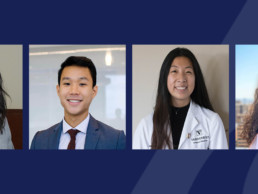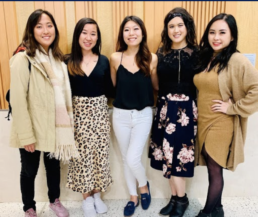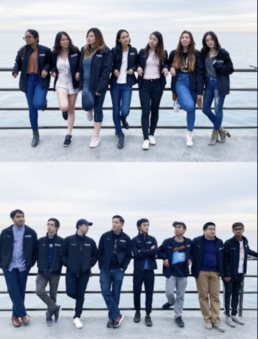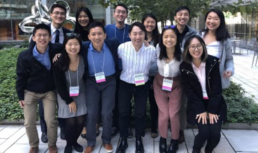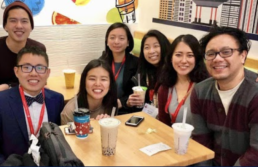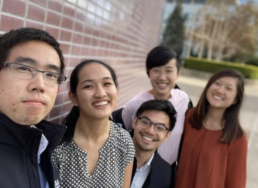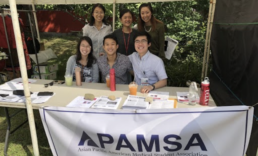A Call to Action and Resources on Coronavirus Response
Since SARS-CoV2 surfaced in Wuhan, China late last year, the pandemic has accelerated at an alarming pace and has now claimed more than 50,000 lives in the United States alone. Amid increasing reports of racist confrontations and widespread shortages of personal protective equipment (PPE), ventilators, hospital beds, testing kits, and healthcare workers, APAMSA is committed to supporting its members and assisting in nationwide efforts. Below, we provide resources for member students to stay informed and recommendations on how to get involved with your local community efforts.
Stay informed:
The situation continues to evolve at a rapid pace, with scientific data and policy guidelines being updated on a daily basis. In addition to conventional news sources, the following are great summative and digestible resources to stay up to date:
Harvard’s COVID curriculum for medical students
Kaiser Family Foundation’s COVID policy watch
Donating Medical Supplies:
Nationwide shortages of protective equipment have placed frontline healthcare workers at risk for contraction of COVID-19. Students who are able can contribute to supply efforts in the following ways:
1) Donate PPE to hospitals in your area
2) Make masks that local healthcare providers can use in situations where using an N95 respirator is not required (see instructional videos below). APAMSA will provide $50 grants to 5 chapters that organize mask-making drives! Please contact our Community Outreach Director Anthony Nguyen at outreach@apamsa.org if you are interested in this grant or if you would like National Board’s support in organizing a drive!
Volunteer Opportunities:
Medical students are in a unique position during this pandemic. While several schools have offered early graduation to allow fourth year students to assist on the frontlines, junior students can also assist with community efforts in meaningful ways.
1) Those who are not volunteering on the front lines must stay at home to flatten the curve and minimize the burden on hospitals.
2) Volunteer and donate:
-
Masterlist Sheet of Medical student volunteer opportunities – What is your school or chapter doing to combat COVID-19? Add it to this list!
-
Donate to nonprofits supporting public health on various fronts
3) Disseminate multilingual resources to help patients who face language barriers to care, such as this AA and NHPI In-Language Resources for Coronavirus (COVID-19) compiled by the Asian and Pacific Islander American Health Forum (APIAHF)
Responding to Acts of Hatred:
With the virus initially breaking out in China and several high-profile figures referring to COVID-19 as “the Chinese virus”, there has been an increase in news reports of hate crimes against Asian & Pacific Islander Americans (APIA). APAMSA explicitly condemns these unconscionable acts and calls on members and peer organizations to help combat this hatred.
-
Your safety and the safety of others takes top priority. In response to active situations in which you or someone else is being harassed or attacked, some nonviolent approaches have involved de-escalation and/or intervening by offering support to the person being targeted.
-
Hollaback! and Asian Americans Advancing Justice are hosting one-hour Bystander Intervention Training where you can learn more strategies to support those facing anti-APIA discrimination. There are six remaining training sessions next month. (We do not officially endorse any specific resource, as many organizations are addressing this issue)
-
Report hate crimes law enforcement or through online forms:
-
Call 1-800-771-7755 (Hotline for those in New York)
-
Be mindful of the language you use to talk about COVID-19
-
This includes encouraging others to avoid language that equates Asian Americans with the virus or with the Chinese government, and discouraging jokes/memes that scapegoat APIA communities.
4) Demand your elected officials, campus leaders, and hospital administrators publicly denounce racism against APIA’s and enact policies that ensure protection and safety from racist violence.
5) Support APIA businesses that are struggling to attract customers due to stigma surrounding the virus.
6) Check in with APIA friends/colleagues and offer support.
In solidarity,
National APAMSA
Statement on U.S. Response to Coronavirus Outbreak
On January 30 the U.S. State Department updated the travel advisory for China to “Level 4: Do Not Travel due to novel coronavirus first identified in Wuhan, China.” Following this advisory, President Trump declared the coronavirus a public health emergency in the United States and signed a proclamation suspending entry of non-U.S. citizens who have traveled to China in the 14 days preceding their attempted entry, except for immediate family of U.S. citizens or lawful permanent residents.
The President also mandated quarantine and medical screening of U.S. citizens upon their return to the U.S. Those who have been in China’s Hubei Province in the 14 days preceding their return will be subject to 14 days of mandatory quarantine. Those who have been to other areas of mainland China in the 14 days preceding their return will be subject to screening at the airport of entry and to heightened monitoring for 14 days.
Although a national response to this outbreak is certainly warranted, we are concerned that policies restricting international travel and collaboration may further escalate tensions by fomenting xenophobia out of proportion to the domestic threat of the outbreak. Through this approach, the U.S. is continuing a decades-old tradition of public health policies that encourage the blanket portrayal of Asian immigrants as carriers of terrible diseases. The American Civil Liberties Union also warned that these drastic measures may impinge on civil liberties. Jay Stanley, a ACLU political analyst, urges that “any detention of travelers and citizens must be scientifically justified and no more intrusive on civil liberties than absolutely necessary.” Plus, it is still unclear how much benefit would be gained from these restrictions and quarantines in addition to promoting basic hygiene practices alone.
In recent weeks there has been an increase in media reports of aggression against APIA (Asian Pacific Islander American) community members, particularly those of Chinese descent. These incidents have occasionally become violent, as in the cases of a man who assaulted a Chinese woman in a New York City subway, and an Asian American teen who was hospitalized following an assault by fellow high school students accusing him of having coronavirus. Similarly, there has been a rise in microaggressive actions targeting APIA students on university campuses, including demeaning comments from faculty and peers about Chinese dining and cultural practices. And some news outlets themselves have depicted the outbreak in ways that feed this paranoia, including using images of people wearing face masks without proper context and using blanket images of local Chinatowns in stories about the virus.
We are also alarmed that there is no longer a federal official in charge of coordinating our national response to global health crises and pandemics. The Trump administration eliminated this office two years ago, leaving us with a patchwork of agencies struggling to mount an organized response to the coronavirus outbreak. We therefore call for immediate reinstatement of this position, as this would improve dissemination of information to local governments hoping to respond to cases that emerge. This would also strengthen our ability to collaborate closely with international health organizations and follow their recommendations as more data on the coronavirus becomes available through medical journals such as the Journal of the American Medical Association (JAMA) and the New England Journal of Medicine (NEJM).
Together we can quell this global outbreak through the work of many agencies collaborating to limit its spread while developing a vaccine or novel antivirals, not by closing borders in ways that feed fear and prejudice.
Asian Pacific American Medical Student Association (APAMSA)
Student National Medical Association (SNMA)
American Medical Student Association (AMSA)
References:
https://www.bbc.com/news/world-51338899
https://www.cnn.com/travel/article/coronavirus-us-travel-restrictions-monday/index.html
https://www.businessinsider.com/coronavirus-us-foreigners-travel-ban-china-2020-1
Additional links:
https://www.politico.com/news/2020/02/04/coronavirus-quaratine-travel-110750
https://workpermit.com/news/coronavirus-us-visa-travel-ban-china-travellers-20200208
APAMSA Interim Executive Board Feature
Happy August, APAMSA! This month, we will be featuring our interim executive board members, who will be serving in this capacity until the 2021 National Conference elections.
-
Interim President: Donna Tran, M3 at Michigan State University College of Human Medicine
-
Interim Advocacy Vice President: Leena Yin, M3 at University of California, San Francisco
-
Interim Membership Vice Presidents: Sai Mupparaju, M3 at Sidney Kimmel Medical College; Jonathan Weng, M2 at NYU Grossman School Of Medicine; Rachel Chang, M3 at Vanderbilt SOM
-
Interim Health Affairs Vice President: John Yuen, G2 at Renaissance School of Medicine at Stony Brook University
This passionate and hardworking group is excited to serve you all! Here, you can read about their favorite APAMSA memories, how they became involved, and their vision for our organization.
Questions? Contact Ryan at communications@apamsa.org.
- Your favorite APAMSA memory:
Donna: During my undergrad at UC Davis, I was actively involved with a Vietnamese Asian American org called VN CARES and that experience sparked my passion for serving vulnerable APIA communities. I knew in medical school I wanted to rekindle my experience in meeting other like-minded APIA individuals who also wanted to better their communities and the world. I literally Googled “Asian medical student association” and found APAMSA. After I joined MSU’s local APAMSA, the rest was history 😉
Leena: I joined my local chapter upon entering medical school, then started getting involved with national advocacy while coordinating our local efforts organizing against the Trump administration’s public charge rule (which has a temporary nationwide injunction, by the way!). Our chapter ended up winning Best Chapter in Advocacy that year, so I traveled to National Conference to accept the reward and also run for Health Advocacy Director. I knew I’d made the right decision when I met all the dope people on National Board!
Jonathan: Upon starting medical school, I quickly met and befriended members of my local chapter. In October, NYU auspiciously hosted the National Conference, during which I became more familiar with the vision, structure, and leadership of national APAMSA. Applying for a Regional Director position post-conference proved to be one of the best decisions of my first year, and I am honored to now serve in this interim capacity.
Sai: I became involved with APAMSA after attending the National Conference in 2019. I was curious about this amazing group and jumped right in as one of the Region 3 Regional Directors!
Rachel: I first became involved through my local APAMSA chapter at Vanderbilt – as someone who’s lived in California all my life, I found the adjustment to the South a big one in terms of food, people, and culture. I later took on more responsibility as a Region IV director in planning a conference at Vanderbilt to promote awareness of APA/AAPI issues in the South, and as an Advocacy Director in my APAMSA Vanderbilt chapter, I facilitated a resident panel and led an open discussion on microaggressions directed towards Asian and Asian American health care professionals/students. Throughout my two years, I’ve found a community in APAMSA that has transcended my time here at Vanderbilt – whether it’s through connecting with students from other medical schools who I share experiences with as an APA individual in the South, or through reuniting with APAMSA alumni at conferences and back in California.
John: I’ve been involved in APAMSA since I was an undergrad at NYU, where I was a part of the eboard of its newly founded pre-med chapter. I was approached by a couple of friends with the prospect of being actively involved in promoting AAPI health and I couldn’t say no. About six years later, that same sentiment is why I’m still involved with APAMSA.
3. What motivated you to run for your position? What are your plans for your position during your term?
Donna: I ran for Interim President (IP) because I wanted to make meaningful systemic changes with our fellow APAMSA friends during this difficult 2020 year. Running for IP while being EVP/CFO is a big undertaking but with the support of the Executive and National Board, I knew in my heart it was possible. I am humbled and grateful for this opportunity to serve everyone in APAMSA and our APIA communities.
For my term, I hope to help others engage in meaningful virtual activities (like our 2021 virtual National Conference!) while encouraging APIA diversity and leadership development for all our students. Our Executive Board has wonderful ideas to implement and I look forward to supporting everyone. Thank you!
Leena: The Advocacy Branch has only been around for 3 years, but we have a lot of momentum, and it’s clearer than ever that the AAPI healthcare community has a role – and more importantly, a responsibility – to fight for justice in all its forms. So I feel passionately about both pushing APAMSA as an organization to become a national leader in advocacy and empowering our members to learn how to advocate throughout their careers.
Our focus in the next year will be to follow the lead of our professional AAPI health org counterparts in fighting for policies that benefit our communities, share resources and educational opportunities around advocacy for our students, and build solidarity with our peer organizations!
Jonathan: This past year as an RD instilled in me the understanding that the National Board exists to unite and serve our ~130 local chapters across the country. The foundation of APAMSA membership enables all other NB branches to run effectively, from holding conferences and community health events to advocating for the underserved and oppressed (whether AAPI or not) to connecting and inspiring the next generation of physicians who will promote the health of the AAPI community. In all, it is no exaggeration to say that APAMSA membership crucially contributes to bettering the national landscape of AAPI health.
The interim Membership VPs have already begun implementing our vision for APAMSA membership! The most pressing issue involves regrouping our constituent chapters on a local and regional level. We have been seeking to first understand the needs of our chapters in this unusual time before supporting them in helpful and practical ways.
Beyond simply doing damage control, we are taking advantage of this era of virtual learning and communication to connect chapters and hold events that would not normally transpire under a primarily in-person paradigm. The iMVPs are particularly interested in improving regional and national documentation, including recordkeeping of these novel events and structures, for the betterment of future APAMSA members and leaders. We continue to recruit new chapters, especially premed ones, even as we concurrently foster long-term professional and personal relationships between existing members at the local, regional, and national levels.
Finally, we, along with the rest of the Executive Board, are currently in the process of rethinking the structure of APAMSA membership as we aim to steward our ever-growing role in national AAPI health.
Sai: I wanted to help APAMSA have better communication between National and our local chapters. I noticed that oftentimes there was not enough communication and our local chapters were unsure of what National APAMSA was up to. I hope that increasing communication will further promote the family-like feeling APAMSA has.
I also wanted to help spearhead promoting diversity in APAMSA and help increase South Asian, Southeast Asian, and Pacific Islander representation among our membership!
Rachel: As a Region IV Director, I hosted our multi-institutional Region IV conference 20/20: Visualizing Health and Beyond at our own Vanderbilt campus, which featured speakers discussing community health and healthcare for immigrants and refugees, mindfulness and physical health, and mental health in APA communities.
I was motivated to run for interim MVP in order to share my experiences of promoting and fostering awareness on APA issues in schools in the South, compared to those on the Northeast or the West. These regional differences play a huge part in our individual experiences, and meeting the needs of our local chapters necessitates a deep understanding of each region’s interests and capacity. Additionally, I wanted to expand communication between MVPs and RDs, and RDs and local chapter leadership in order to facilitate idea sharing and determining the needs of our chapters. As an interim MVP and with my fellow iMVPs Sai and Jonathan, we have already begun our work in facilitating our virtual regional conferences in light of COVID-19 and holding an RD Town Hall. We are in the process of finalizing a Local Chapter Resources Guide, which we hope to distribute to all local chapters in order to inspire events, gain more familiarity with National Board and its opportunities, and improve transparency on grants and other funding available for chapter events. Finally, we are continuing to recruit new chapters to our APAMSA family.
John: The umbrella of Health Affairs revolves around being engaged in the community and again, is one of the reasons why I love being a part of APASMA. COVID-19 has obviously made it difficult for us to reach our communities. 2020 is perceived as this series of unfortunate events, but I think that with the pandemic and the increased energy our country (and the world) has in tackling injustice and inequity, this is an amazing time for APAMSA’s 120+ chapters to assess the needs of their communities and make concrete steps in meeting them. During my term, I hope to provide all of our chapters with ideas and resources to kickstart (virtual) events this upcoming academic year, starting with putting out a guide to getting more involved in Health Affairs. Additionally, we are planning on working with the Advocacy Branch on items such as voter registration!
4. What are your interests/passions/hobbies? (outside of APAMSA, of course :D)
Donna: Bouldering/rock climbing, Yelp Elite foodie, ocean beach, nerdy TV shows (Doctor Who and Game of Thrones)
Leena: I read a lot of manga and webnovels, drink a lot of boba, and love karaoke (outside of COVID times).
Jonathan: Outside of APAMSA, my interests include playing and listening to music, playing and watching basketball, and studying and practicing theology. I enjoy spending alone time with a book, but there is nothing quite like the company of friends and family. If I were not an aspiring physician, I might have pursued a career in technology, finance, or ministry.
Sai: If COVID were not happening, I would often be found in some hipster cafe, in a dance class, or wandering around Philly. Now, I’m obsessed with doing Chloe Ting workouts, different coffee brews to make at home (and compensate for no cafes), and still dancing around my apartment.
Rachel: I love reading, running, the beach, boba, and watching bad reality TV D:
John: I love watching/playing/breathing basketball, drinking craft beer, and cooking!
Statement on the Detainment of Iranians and Iranian Americans at the Washington-Canada Border
Over the weekend of January 4th, over 60 Iranians and Iranian Americans were detained at Washington State’s border with Canada and subjected to questions about their political views and allegiances, for up to 10 hours. Some were eventually refused entry. As an organization, APAMSA stands with our Iranian siblings and reaffirms our commitment to immigrant rights. The rights of all Americans and immigrants should be respected regardless of Iranian origin or descent.
From Japanese American internment during World War II to hundreds of hate crimes against South Asians/SWANA (Southwest Asian and North African) folks after 9/11, Asian Americans and Pacific Islanders are all too familiar with the othering, scapegoating, and violence that befalls our communities in times of international conflict. No matter who we are or how long our families have been in this country, we have been accused of being foreign, spies, or terrorists. Such accusations are ironic in that 1) they have never been effective for protecting national security – and indeed, are predicated more on racism than safety; 2) from farms to railroads, America was built with the support of our ancestors; and 3) although many of our families migrated here to seek better lives, many were also forced to do so by American interference in our countries of origin.
This is not the first time that immigration officials under the Trump administration have violated due process rights, and these recent actions further reinforce our understanding that despite the 14th Amendment, our citizenship does not protect us and any one of us could be targeted next. In this time of crisis, we encourage chapter leaders to support members who are personally impacted by the current environment, and all APAMSA members to familiarize themselves with the rights of themselves and their patients.
From the Council on American-Islamic Relations (CAIR) community advisory:
If you are visited by federal law enforcement agents, remember:
-
You have the legal right to have a lawyer present when speaking with federal law enforcement agencies. This is true even if you are not a citizen or have been arrested or detained… Refusing to answer questions cannot be held against you and does not imply that you have something to hide. Answering a question incorrectly can hurt you more than not answering at all. An attorney is best able to protect your rights.
-
You do not have to permit any law enforcement officer to enter your home or office if they do not have a warrant… If they say they have a warrant, politely ask to see it before allowing them to enter. If they have a warrant, be courteous and polite, but remember that you are under no obligation to answer questions without a lawyer present. You should tell the agents that you do not consent to the search so that they cannot go beyond what the warrant authorizes.
-
You should never lie or provide false information to any law enforcement agency. Lying to law enforcement agents under any circumstance is a federal crime.
While traveling, remember:
-
TSA/CBP cannot target you for additional screening or questions based on religious, racial, or ethnic profiling.
-
US citizens cannot be denied entry for refusing to answer questions. Green card holders cannot be refused entry, unless their travel was not brief and innocent per USC 1101(a)(14). However, invoking your rights may result in delays.
-
Non-citizen visa holders can be denied entry into the country for refusing to cooperate. If you have concerns, please speak to an attorney.
More legal resources can be found in CAIR’s “Know Your Rights” Guides (available in Arabic, Bengali, Bosnian, Farsi, Somali, and Urdu) and the Iranian American Bar Association’s Community Advisory.
APAMSA condemns the illegal detention of United States citizens, the ongoing threats against immigrant families, and the escalating xenophobia and racism that impacts the health and wellbeing of our communities.
In solidarity,
Your APAMSA National Board
APAMSA Response to Alabama Abortion Law
APAMSA opposes recent political efforts in several states to undermine women’s ability to access necessary health care.
On Wednesday May 16th, Alabama’s governor signed into law a near-total ban on abortions from the time of conception, without exceptions for rape or incest. The law also allows doctors to be charged with up to a 99-year sentence for performing abortions in the state, if the mother’s life is not endangered.
A number of “heartbeat” bills have also passed in Iowa, Ohio, Kentucky, Mississippi, and Georgia, and there are efforts underway to pass such bills in Missouri, Louisiana, South Carolina, and West Virginia. These bills ban abortions after a fetal “heartbeat” can be detected, as early as six weeks into woman’s pregnancy. This is before many women are aware they are pregnant.
These laws pose a direct challenge to the standards established by the Supreme Court’s 1973 decision in Roe v. Wade regarding pregnant women’s liberty to choose to have an abortion, and threaten to severely limit access to what the American College of Obstetricians and Gynecologists (ACOG) recognizes as “an essential component of women’s health care” that should be discussed between patients and their health care providers “without undue interference by outside parties.” This recent wave of legislative actions by these states are clearly not just an infringement on a doctor’s ability to practice medicine but more importantly an encroachment on women’s Constitutionally protected reproductive rights.
For those who will be affected, please keep in mind that these bans have not taken effect yet. Specifically, the law in Alabama will not take effect for another six months. Additionally, the bill will likely be contested through the judicial system, so please get involved and make your voices heard through appropriate channels. Continue to stay informed on your local state laws and ensure that you have accurate information to help your patients navigate their healthcare. Our Advocacy Branch will post updates as more developments emerge and will list organizations working to combat the changes and/or to support patients.
We at APAMSA stand with healthcare providers in ensuring the best care for patients, and we stand with women in ensuring they have full access to medically indicated care.
In Solidarity,
Your APAMSA Leadership
The Asian Pacific American Medical Students Association (APAMSA) is a national organization of medical and pre-medical students committed to addressing the unique health challenges of Asian and Pacific Islander American (APIA) communities.
References:
-
https://www.vox.com/2019/5/14/18623474/alabama-abortion-kay-ivey-roe-v-wade
-
https://www.vox.com/2019/5/16/18626744/alabama-abortion-law-legal-50-states-roe
-
https://abcnews.go.com/Politics/wireStory/house-gop-leader-alabama-abortion-law-63082615
-
https://www.nytimes.com/interactive/2019/us/abortion-laws-states.html
-
https://www.cnn.com/2019/05/16/politics/states-abortion-laws/index.html
APAMSA, SNMA, LMSA, AMSA Respond to Texas Tech’s Decision to Eliminate Race from Medical School Admissions
On Tuesday April 9, 2019, Texas Tech University Health Center Sciences Center came to an agreement with the U.S. Department of Education’s Office of Civil Rights to cease using race or national origin as one of the many factors involved in their admission process. As organizations who support, encourage, and uplift students who are underrepresented minorities, we are concerned with the outcome of future admissions cycles for underrepresented minority applicants going forward and fear this decision could have damaging effects on the health of communities of color. Previous literature has estimated that programs that banned race-conscious admissions led to a 17% decline of underrepresented students of color enrolling in medical school at public institutions in those states, underlining the consequences that the Texas Tech decision and similar policies will have on the diversity of future in-coming medical school classes and the health of their surrounding communities.
View the full Joint Statement on SNMA’s website!
